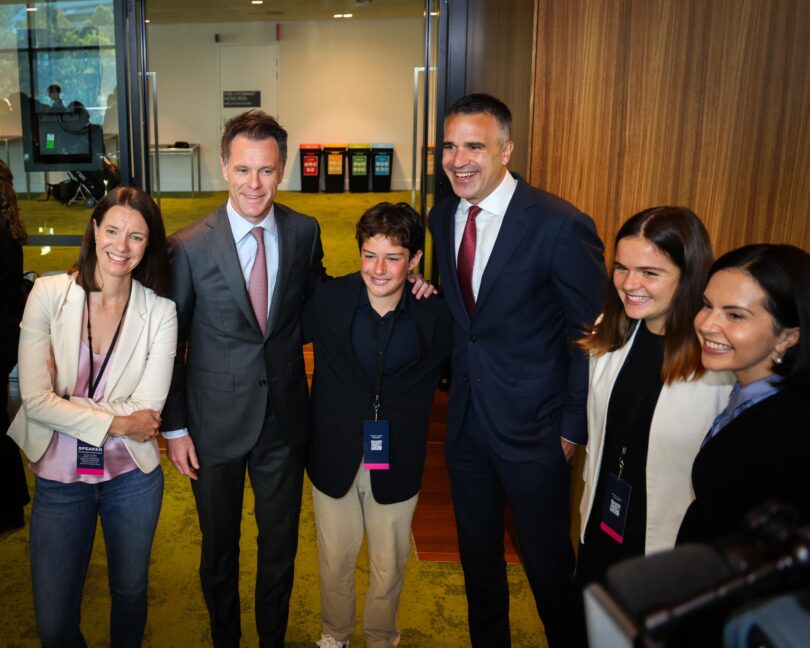CHRIS MINNS SPEECH – ADDRESS TO THE SOCIAL MEDIA SUMMIT DAY 2 ADELAIDE CONVENTION CENTRE, ADELAIDE
FRIDAY, 11 OCTOBER 2024
Thank you so much Annabel for that warm introduction. Thank you so much Peter for that virtual tour of Adelaide.
Rest assured, I’m sure there’s more to this city than the Upper House and the casino, and I can’t wait to see it, but at least I don’t have to do one of those red top busses this afternoon.
Thank you very much for having me here and my colleague, Rose Jackson.

I’d like to acknowledge the Kaurna people and thank everyone who’s here, for what is a unique initiative.
Two States coming together to discuss a policy issue affecting our states, but not simply unique to just our communities.
It’s probably not been done before, but I don’t think it should be the last.
One of the great underutilised parts of Australia’s Federation is that states can borrow from each other. Grab what works in one jurisdiction and apply it somewhere else.
Learn from another community’s mistakes and hopefully, take advantage of opportunities.
State Premiers are usually only mentioned in media reports side by side when something goes wrong or when we’re jointly going after the Commonwealth Government for more money.
And there’s absolutely nothing wrong with doing that.

Although, Delegates, I do need to tell you the entire initiative, the two-day summit, the joint government announcements, the cooperation between New South Wales and South Australia was nearly de-railed four weeks ago when the Swans smashed Port Adelaide 95 to 59 and Premier Malinauskas stormed out of Sydney.
Now, word never reached us as to how Sydney did in the Grand Final, so I’m not able to update you.
Yesterday’s day 1 of the summit was a breakthrough. A common consensus that social media left unchecked, uncensored, un-supervised poses a threat, particularly to young people in our community.
As well as that, there was a consensus of a determination to do something about it.
I think that it painted a picture, that we are in control of our own future in a democracy.
That decisions about the health of the next generation should not default to Silicon Valley billionaires.
And that parents need help. Acting “one out” and restricting social media use for your own children, when social media use by any objective measure is so ubiquitous in our community is just too difficult.
The facts presented yesterday by Professor Jean Twenge are stark.
The rates of clinical depression amongst those aged 12-17 doubled following the rise of Facebook.
Emergency Room visits for self-harm doubled for girls in particular aged 15-19 in the US and quintupled amongst 10-14 year olds over the same period of time.
In the US, the simple question asked of young people, “Are you satisfied with your life” saw steady gains from 1970’s all the way to 2012 – then fell off a cliff by 25% from 2012 to where we are today.
In Australia, according to Dr Michael Carr-Greg mental health risks amongst young people rose by 25% over the same period of time.
Let’s be honest about this. There is no plausible alternative theory that can account for this disturbing rise in the mental anguish faced by young people, other than the ubiquitous use of social media in our community.
There’s also limited resources that we, as parents, can lean on to get the best information to deal with this global, unregulated experiment on the next generation.
We weren’t exposed to this level of digital intrusion when we were kids and neither were our parents.
So the single best resource and advice that parents have, when dealing with a problem facing your children, and that is, sitting down and asking your own mum what she did when you were a complete pain in the ass, is not available because this is the first generation that has confronted this challenge.
Some have said that this will end up being a complete talk fest.
I think in fairness to state governments and all of you delegates, I don’t think there’s never been a summit anywhere, held by any government that wasn’t characterised, before it began, as a “complete talk-fest”.
But can I say, what’s wrong with talking?
Afterall, the point of this conference is that talking is far better than scrolling. And human interaction is the basis of social progress.
At the very least, we’ll be able to get the facts into the hands of parents. And these are that most 16 year olds are on social media more than 3 hours a day.
That experts believe its robbing them of hours and time with their family and their friends.
It’s sapping their energy, their creativity – the spontaneity of life.
It’s seriously affecting their sleep, which is crucial for development and happiness and that probably the single best, easiest and most effective tip experts would give to a busy parent is, at the very least, get smart phones out of the bedroom at night.
Now as a result, of Peters’ leadership on this issue, putting it on the national agenda and driving for change, to the Federal Government’s great credit, we’re now in a position where we are on the verge of a national social media ban for young people.
That means individual states won’t have to act alone and it will stop social media companies from pitting one jurisdiction against another.
So I would humbly say these summits are worth it. They’re going to make a difference. And we genuinely appreciate you taking the time out of your day to tell us your stories and add to the body of evidence.
I particularly want to acknowledge and congratulate the young people in attendance today, giving up their time and their insights.
Nobody – not governments, not civic leaders – wants to make these decisions in a vacuum. We value your input, we value your time and we want to hear you today.
One young participant, a particularly vibrant and energetic young man, came up to me in Sydney yesterday and he said – “Ok, if this ban goes through, and you’re going to knock out 3 hours of social media use a day, what’s going to replace it?”
And I think he is 100% right.
Jonathon Haidt’s groundbreaking research on this issue indicates that the use of online platforms, social media and technology is not solely to blame, for what he terms “the anxious generation”.
There is also an increasing coddling of kids, a fear that exposure to the wide world without limited supervision will harm children.
Now ironically this approach, in some instances, has led to hours online contact, completely unsupervised, with total strangers.
But it’s a massive challenge faced by states governments and one that we can’t palm off to the Federal Government or Silicon Valley.
I’ll give you an example. Urban planning in Sydney has meant less open spaces for young people.
Locking up of public school playgrounds has restricted thousands of basketball courts, local parks and playing fields.
All with a view to save a school window from being broken, we have literally deprived kids of an oval to run around in and time spent with their friends.
During the COVID lockdown in Sydney, it was revealed by some researchers that in Western and South-Western Sydney, most people lived more than one kilometre from a sizeable public park and many lived more than two kilometres from a big public oval.
So we need to build far more outdoor spaces for children, not lock them out of it.
We need to completely resist the idea that a group with a skateboard, or a scooter or a basketball are up to no good.
But instead be thrilled that they’re out of the house, spending time with their friends in the wide, wide world.
Delegates I genuinely want to thank you for your time here today.
With the right policies, and a bit of will, we can take back control of our lives and have technology work for us, rather than us work for technology.







